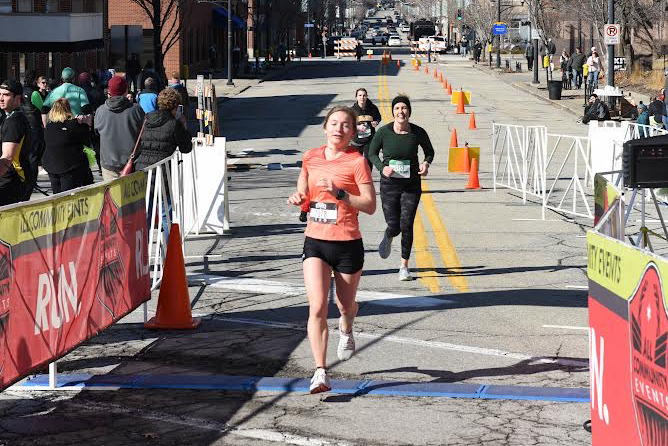Teresa Richer qualified for track and field nationals in the marathon on Saturday by running a time of 3:28:50 in the Saint Paddy’s Marathon in Des Moines, Iowa.
A first-year exercise science major at Goshen College, Richer is the school’s only marathon runner this year. She qualified by running nearly five minutes faster than the “A” standard of the National Association of Intercollegiate Athletics (NAIA).Richer had planned to start classes in the fall after graduating high school in 2021, but opted to take the semester off to undergo testing for her epilepsy. Both Richer and her doctors thought it would be easiest to take time off before starting college, as testing could be incredibly time-consuming.
“I had my first seizure when I was 16,” Richer said. “We were standing by the car with our things and my eyes rolled back and my head jerked to the left. I remained standing, but [my sister] Naomi noticed something was wrong.”
After being rushed to the hospital and undergoing a CAT scan and several other tests, Richer was sent home.
“[The doctors] said ‘everyone is given one free seizure’ and let me go,” Richer said. “It wasn’t until 5 months later that I had my second seizure, and ever since then I have had them.”
Last fall, Richer underwent testing at the Mayo Clinic in Rochester, Minnesota. Each of the visits consisted of a week-long EEG test during which Richer was restricted to lying in bed.
“Throughout my whole stay I am being watched by cameras, being sleep- deprived and tapered off my seizure medication,” Richer said.
The final test was a diagnostic surgery, an experience that was both painful and isolating.
“Spending so much time in hospitals and seeing so many people in desperate need was eerie,” Richer said. “Being someone who is still capable of doing things… it was frustrating having people treat me like I am… weak.”
Richer’s condition makes her dependent on other people. She is unable to drive and feels more comfortable surrounding herself with others at all times, just in case she does have a seizure.
“The track team is incredibly supportive of each other both in how we perform athletically and in our day-to-day lives,” Richer said.
She also credits a lot of her positive track experience to head coach Rustin Nyce.
“Rustin made me feel a part of the team even before I was a student at GC and this just shows how welcoming and approachable he is,” she said.
The race on Saturday was Richer’s third, all of which she has run in the past year. This is the last year the marathon will be a sanctioned event in the NAIA.
“Running [the marathon] was never like, ‘should I do it?’” Richer said. “It was more like, ‘I’m going to do it, as long as Rustin says yes.’”
Nyce helped train Richer for the marathon, guiding her in workouts, hydration and nutrition. The training largely focused on building speed on tired legs so that when race day came, she wouldn’t get fatigued quickly.
Now that she has qualified for nationals, Richer plans to take time off to let her body fully recover before jumping back into training for the Nationals race. She’ll follow the same regimen that Nyce had curated previously, but will adjust the workouts to train for faster times.
“Epilepsy has also shown me what patience is and how important it is to not take advantage of the chances we are given,” Richer said. “Some days, I’m frustrated with having epilepsy, but it really has formed who I am.”
In May, Richer will compete at nationals in Gulf Shores, Alabama.


